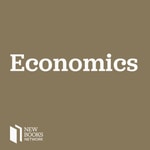New Books in Economics – Details, episodes & analysis
Podcast details
Technical and general information from the podcast's RSS feed.

New Books in Economics
Marshall Poe
Frequency: 1 episode/4d. Total Eps: 1423

Recent rankings
Latest chart positions across Apple Podcasts and Spotify rankings.
Apple Podcasts
🇬🇧 Great Britain - socialSciences
27/07/2025#86🇬🇧 Great Britain - socialSciences
26/07/2025#58🇫🇷 France - socialSciences
26/07/2025#93🇬🇧 Great Britain - socialSciences
25/07/2025#32🇫🇷 France - socialSciences
25/07/2025#90🇬🇧 Great Britain - socialSciences
24/07/2025#71🇫🇷 France - socialSciences
24/07/2025#93🇬🇧 Great Britain - socialSciences
23/07/2025#53🇫🇷 France - socialSciences
23/07/2025#90🇬🇧 Great Britain - socialSciences
22/07/2025#34
Spotify
No recent rankings available
Shared links between episodes and podcasts
Links found in episode descriptions and other podcasts that share them.
See all- https://www.sensorylogic.com
245 shares
- https://emotionswizard.com.
244 shares
- https://twitter.com/bucephalus424
16 shares
- https://twitter.com/olio_ex
4 shares
RSS feed quality and score
Technical evaluation of the podcast's RSS feed quality and structure.
See allScore global : 53%
Publication history
Monthly episode publishing history over the past years.
Manuela Moschella, "Unexpected Revolutionaries: How Central Banks Made and Unmade Economic Orthodoxy" (Cornell UP, 2024)
Episode 56
dimanche 1 septembre 2024 • Duration 46:03
The Human Advantage: A Conversation with Jay Richards
Episode 116
mercredi 28 août 2024 • Duration 54:51
Tehila Sasson, "The Solidarity Economy: Nonprofits and the Making of Neoliberalism after Empire" (Princeton UP, 2024)
Episode 107
mercredi 14 août 2024 • Duration 56:52
Mark J. Higgins, "Investing in U.S. Financial History: Understanding the Past to Forecast the Future" (Greenleaf, 2024)
Episode 55
mercredi 13 mars 2024 • Duration 41:07
Richard Vague, "A Brief History of Doom: Two Hundred Years of Financial Crises" (U Pennsylvania Press, 2019)
Episode 10
jeudi 4 juillet 2019 • Duration 36:27
Yuen Yuen Ang, "How China Escaped the Poverty Trap" (Cornell UP, 2016)
Episode 27
mardi 2 juillet 2019 • Duration 41:36
Tobias Straumann, "1931: Debt, Crisis, and the Rise of Hitler" (Oxford UP, 2019)
Episode 69
jeudi 27 juin 2019 • Duration 01:03:31
Joseph C. Sternberg, "The Theft of a Decade: How the Baby Boomers Stole the Millennials’ Economic Future" (PublicAffairs, 2019)
Episode 78
mardi 11 juin 2019 • Duration 01:03:39
Francesca Trivellato, "The Promise and Peril of Credit" (Princeton UP, 2019)
Episode 513
vendredi 7 juin 2019 • Duration 01:02:04
Annie McClanahan, "Dead Pledges: Debt, Crisis, and Twenty-First Century Culture" (Stanford UP, 2016)
Episode 125
vendredi 7 juin 2019 • Duration 59:58









